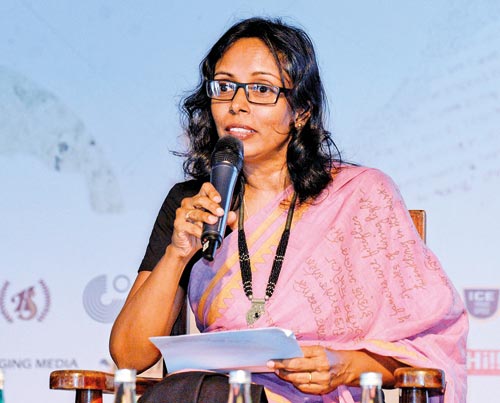If food be the essence of life, read on

Writing on the colonial encounter: Ramya Chamalie Jirasinghe at a recent appearance at the Ceylon Literary Festival. Pic by Indika Handuwala
A passionate foodie, Ramya Chamalie Jirasinghe evokes the exotic whiff of Bolo di Amor against the setting of a fictional 18th century colonial fort very much like our own Galle Fort in her new novel, ‘Father Cabraal’s Recipe for Love Cake’.
It all seems all very inebriating – that tang of semolina and ‘puhul dosi’ and rosewater amidst pillared verandahs and cobblestoned streets – even though the food is really only an aperitif for the story.
Ramya, poet, novelist, screenwriter and non-fiction writer whipped up the first lines of the book in 2009, for the UK’s Guardian newspaper’s “Guardian Orange First Words Competition”. They welled up from her fertile subconscious – fragrant, sensual, delicious, promising of more delights to come:
“Dona Isabella Kathirina Fernando, 38 years old and new owner of the house with the longest veranda in the sacked Galle Fort, knows this about the cake from which she makes her living: a good love cake is like the memory of a lost lover’s kiss.
She knows its crumbling interior as well as she knows the inside of her folded arm. The cake’s aroma, when it comes out of the oven, is as familiar to her as the scent of the one frangipani she tucks behind her ear. She understands how the cake mellows in the cooling cupboard at the end of the corridor the way she feels her pillow soothing her at mid-day when the heat of the sun leaps off the sea outside her house and creeps in through the latticed windows. Kathirina knows all this about her bolo-di-amore even though she never tasted her lover’s kiss.”
Much tweaked and edited, this paragraph which won a Runner-up award, was the beginning of a book fourteen years in the making.
The Galle Fort is definitely terra cognita for Ramya, having worked there before its ‘gentrification’ when it became the whole island’s Mayfair. She evokes in the book the people, the interiors of the original houses and the atmosphere at night in those picaresque alleyways.
The novel deals with how the protagonist, who makes a love cake “as sweet as wild honey and as unforgettable as a great love” is haunted by her past when during an insurgency a fugitive enters her house.
Says Ramya, “It draws on colonialism, its extraction of resources, its trade in goods and humans, and the mark this has left on countries such as ours today.
“It also fictionalizes several less-discussed historical events. Such as slavery in this part of the world, and the lives of African people and Arabian traders who got caught to colonial invasions, as well as contemporary events from Sri Lanka.”
The first COVID lockdown was what pushed her up against the keyboard. She would work for four to eight hours every day for three months.
The book would probably still be languishing in a drawer if not for the pandemic as Ramya the natural poet finds dealing with a full-length novel ‘very daunting’. “Also, there is a somatic difference between the processes of writing poetry and writing long-form fiction. A novel can take a toll on your body in a way poetry doesn’t.”
The food is there however, not just on the evocative, sensual or olfactory level.
“For many people, food is about survival, and it is a marker of poverty. Much of the colonial encounter, the slave trade and indentured-labour markets were built on spices and plantation industries such as coffee, tea and sugarcane. The legacy of that encounter is a lived experience for us in countries like Sri Lanka, and that wafts through the novel.”
Ramya’s first poetry collection, ‘There’s an Island in the Bone’ won the 2011 Sri Lanka State Literary Joint Award. She was long listed for the Fish Poetry Prize, Ireland, 2011, and TimesOnline, UK, featured her in its 2009 selection of Contemporary War Poetry. Her book, ‘Love Poems from a Frangipani Garden’ was published by Mica Press, UK.
The winner of the Gratiaen Prize will be announced on June 1, 2024.
Searching for an ideal partner? Find your soul mate on Hitad.lk, Sri Lanka's favourite marriage proposals page. With Hitad.lk matrimonial advertisements you have access to thousands of ads from potential suitors who are looking for someone just like you.


